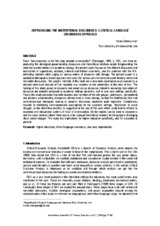Reproducing the institutional discourses: a critical language awareness approach
Autor
Zarrinjooei, Nahid
Editor
Universidad de Córdoba, UCOPressFecha
2016Materia
Higher educationCritical language awareness
Viva voce
Reproduction
METS:
Mostrar el registro METSPREMIS:
Mostrar el registro PREMISMetadatos
Mostrar el registro completo del ítemResumen
Since “consciousness is the first step towards emancipation” (Fairclough, 1989, p. 233), and since reproducing
the ideological power-bearing discourses and hierarchical relations needs foregrounding the
taken-for-granted relations in academic settings, the present study focuses on the different discourses and
interactions of supervisors, advisors, external and internal examiners, and the audience with the M.A.
defending students while urging on various orders of discourse with change. The present paper is a
qualitative ethnography-based approach and sees into various commonsensical power-bearing verbal and
nonverbal discourses. The specific methods of this work are a long-term observation accompanied by a
detailed contextual analysis of five recorded viva sessions in two universities in the west of Iran. The
findings of this study, power in discourse and power above discourse, helped in answering how orders of
discourse are naturally produced in academic settings generally, and in viva voce settings specifically.
Finally, this study concedes that both students and members of the elite groups _professors_ comprehend
and produce power-bearing discourses without even a minor change, so that the traditionally held and
commonsensical ideologies leading to powerful discourses appeared quite legitimate. Compliances
resulted in reinforcing commonsensical assumptions in the academic settings. Resistance or social
struggle, as the alternative reaction, is suggested at the end of this work which could lead to reforms in
academic and educational systems in favor of emancipation. Similar studies can be done in classrooms
and the same contexts where there seems to be unequal hierarchical relations for the purpose of bringing
about social struggle. This study has implications for higher education specifically, and for education in
general.

